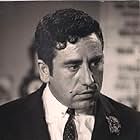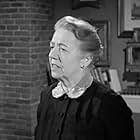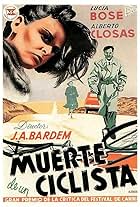En una pequeña localidad española, un grupo de señoras decide que en la Noche Buena cada casa de bien acogerá a una persona sin hogar.En una pequeña localidad española, un grupo de señoras decide que en la Noche Buena cada casa de bien acogerá a una persona sin hogar.En una pequeña localidad española, un grupo de señoras decide que en la Noche Buena cada casa de bien acogerá a una persona sin hogar.
- Dirección
- Guionistas
- Elenco
- Nominado a 1 premio Óscar
- 7 premios ganados y 2 nominaciones en total
Cassen
- Plácido Alonso
- (as Casto Sendra 'Cassen')
José María Caffarel
- Zapater
- (as José Mª Caffarel)
Gloria Osuna
- Lali
- (as Gloria F. Osuna)
Opiniones destacadas
Directed in 1961 by this great director Luis Garcia Berlanga, believe his better movie with an incredible perfection, handling the times inventing the plane it sequences. With a seemingly simple synopsis: In a city of provinces, the Ladies' Meeting decides to promote a charitable campaign for the Christmas: the small bourgeois es will sit to his table to a poor person in the dinner of Christmas Eve. And to help to convince, also they will have the opportunity to invite the famous one to his table. All this supported by the manufacturer of pots Cocinex. With an exceptional script in which it takes care of all the details, offering a real statement of Spanish, so unbalanced company where the rich ones they are done mas rich and the poor are done mas poor. In spite of the fact that it is of the year 1961 it continues being a masterpiece, which has not been overcome in spite of the years, unforgettable prominent figures, a movie that every lover of the cinema must see.
My grandmom is 90 years old now. when she was giving presents for christmas she wanted always to give gifts to a lot of people beyond the close family. for example to people from the portuguese village where she lived with my grandfather and my father for a lot of years (even though she wasn't born there she lived there a long time). Usually the gifts for those people were merely things that could be bought for one or two euros. I used to ask her: "why do you buy those gifts, there just cheap stuff they don't care and need". the answer used to be something like this: "poor them they wouldn't know, for them is very big already!" - a table cloth for two euros is not important for anyone sorry. at the end of the day it was never about giving them gifts. but it was because plus they already had that for other christmases. she wanted to feel better with herself thinking how good of a person she was. she still thinks now a days she's humble and a one of the most generous people in the globe: i can't complain, but i would tell you that i always doubt that.
"placido" is pretty much a film about that: high or middle high class people receiving poor citizens in their homes for christmas eve. they don't like them, they don't want them, they treat better their dogs than them. one getting a cold, a disease or getting drunk is a tragedy: not because someone got a disease but because that could expose the facade they built: the idea they're very generous and humble and everyone will go to heaven because of that.
it's never from the heart. it's never from good intentions with this film. it's always for other people to see how good they are. my grandmom did this in a smaller scale true: but this is a exaggeration of reality. the ideia you'll have a parade in the middle of the cold where poor people can get sick, but they're there to applaud stars from madrid beause they need to please the event organizers is the beggining of this crazy journey where placido just wants to pay the installment of his motorbike.
so yeah it's always about the organizers policing each other, checking if everyone "is good". is kinda a foucalt's panopticon of charity: eveyone check if everyone is doing the good, is having a poor peasant in their house. the peasants: they can even die that the tragedy is always for the people who hold them for the night. they're just props, they're pawns not people. they're instruments that make the others not only feel better but mostly feel they won't be judged by anyone else. poor people as instruments to control the high class, to make them feel good about themselves even if at the end of the dinner they go back to their cold houses or even the street.
what happens inside the doors is a different story. and berlanga shows this as a master: the scenes are always vivid, full of people talking, they're quick and witty, don't let anyone breathe. i laughed my ass off a lot of the time just seing the absurd and relating to this, because in portugal things weren't that different. heck in some places you'll probably still find people like this. arrested development, the tv show, was a bit like this on the best of its times: people just talking above each other, fully of different type of conversations happening at the same time. sometimes we have three conversarions or four in the same scene.
the events taking place are one more ludicrous than the other. they just continue to mount, and placido's problem just grows and grows and grows because people are so worried in their own bubbles to feel themselves better than they couldn't care less when a low class citizen as a problem. the hypocrisy of a society that wanted allways to appear good, not to be good. poors are just the losers they feel they need to help because they might be criticized if they don't. but at the end of the day is more important to sell cooking pots, to marry people "living in sin" and to feed your dog.
at the end of the day this is a great rich comedy that wants to criticize spanish society. it works on both sides. but even if you have zero context about this, it's still a work of genious. like arrested development. it's a great film, one of the best comedies i've ever seen. after enjoying a lot bienvenido mr marshall, watching placido makes me really think berlanga is a genious. the comedy tone is perfect. the criticism also. it has minor problems? yes. but it's so well made and conceived that laughing out loud and applauding is the only thing i can do. if you know or understand a bit of spanish watch this by any means necessary. if you don', you'll have more problems on understanding but...watch it too... it's an amazing movie.
"placido" is pretty much a film about that: high or middle high class people receiving poor citizens in their homes for christmas eve. they don't like them, they don't want them, they treat better their dogs than them. one getting a cold, a disease or getting drunk is a tragedy: not because someone got a disease but because that could expose the facade they built: the idea they're very generous and humble and everyone will go to heaven because of that.
it's never from the heart. it's never from good intentions with this film. it's always for other people to see how good they are. my grandmom did this in a smaller scale true: but this is a exaggeration of reality. the ideia you'll have a parade in the middle of the cold where poor people can get sick, but they're there to applaud stars from madrid beause they need to please the event organizers is the beggining of this crazy journey where placido just wants to pay the installment of his motorbike.
so yeah it's always about the organizers policing each other, checking if everyone "is good". is kinda a foucalt's panopticon of charity: eveyone check if everyone is doing the good, is having a poor peasant in their house. the peasants: they can even die that the tragedy is always for the people who hold them for the night. they're just props, they're pawns not people. they're instruments that make the others not only feel better but mostly feel they won't be judged by anyone else. poor people as instruments to control the high class, to make them feel good about themselves even if at the end of the dinner they go back to their cold houses or even the street.
what happens inside the doors is a different story. and berlanga shows this as a master: the scenes are always vivid, full of people talking, they're quick and witty, don't let anyone breathe. i laughed my ass off a lot of the time just seing the absurd and relating to this, because in portugal things weren't that different. heck in some places you'll probably still find people like this. arrested development, the tv show, was a bit like this on the best of its times: people just talking above each other, fully of different type of conversations happening at the same time. sometimes we have three conversarions or four in the same scene.
the events taking place are one more ludicrous than the other. they just continue to mount, and placido's problem just grows and grows and grows because people are so worried in their own bubbles to feel themselves better than they couldn't care less when a low class citizen as a problem. the hypocrisy of a society that wanted allways to appear good, not to be good. poors are just the losers they feel they need to help because they might be criticized if they don't. but at the end of the day is more important to sell cooking pots, to marry people "living in sin" and to feed your dog.
at the end of the day this is a great rich comedy that wants to criticize spanish society. it works on both sides. but even if you have zero context about this, it's still a work of genious. like arrested development. it's a great film, one of the best comedies i've ever seen. after enjoying a lot bienvenido mr marshall, watching placido makes me really think berlanga is a genious. the comedy tone is perfect. the criticism also. it has minor problems? yes. but it's so well made and conceived that laughing out loud and applauding is the only thing i can do. if you know or understand a bit of spanish watch this by any means necessary. if you don', you'll have more problems on understanding but...watch it too... it's an amazing movie.
I have seen hundreds of placidos in real life,I'm 37 and I was born in south spain, this movie is a fresco very close to the truth, a wonder in every aspect, placido takes the central role, the gravitational axis, everyone is a cinic in this film, except placido, this trick makes everything works as berlanga wants increasing the effect of desolation. Tragicomical in the same way that chaplin and rossellini.
The atmosphere of this film took me back to another time and place, to a very naive and innocent Spain. This film is Garcia Berlanga's incursion into his own brand of neorealism. The music keeps evoking the scores of the great Italian masterpieces of that period.
Placido, the hero, in a way, is everyman caught in a web of bureaucracy where he has to fight against all the odds to keep his vehicle in order to survive. He does whatever he can in order to pay the draft, but all conspires against him. Placido is a decent working person, a man of honor who has to fulfill his obligations, in this case, paying the draft that is due on the day the story unfolds. Everything is against him. We see him fighting his way to do so, in this, his long journey into the Christmas Eve celebration.
Cassen was a marvelous and charismatic actor who was very convincing as Placido. He's always at the center of the action, and at times, he is even at the center of some of the other characters conflicts. Jose Luis Lopez Vazquez, is very effective as Gabino, the photographer. The rest of the ensemble cast perform very well under the direction of Garcia Berlanga.
The film is a lot of fun.
Placido, the hero, in a way, is everyman caught in a web of bureaucracy where he has to fight against all the odds to keep his vehicle in order to survive. He does whatever he can in order to pay the draft, but all conspires against him. Placido is a decent working person, a man of honor who has to fulfill his obligations, in this case, paying the draft that is due on the day the story unfolds. Everything is against him. We see him fighting his way to do so, in this, his long journey into the Christmas Eve celebration.
Cassen was a marvelous and charismatic actor who was very convincing as Placido. He's always at the center of the action, and at times, he is even at the center of some of the other characters conflicts. Jose Luis Lopez Vazquez, is very effective as Gabino, the photographer. The rest of the ensemble cast perform very well under the direction of Garcia Berlanga.
The film is a lot of fun.
As is almost always the case with the films of Berlanga, this film is a comedy on the surface, which hides a very hard and crude criticism of the situation of Spanish society during the dictatorship. In those years, Spanish filmmakers couldn't speak freely and openly about the dismal state of their country, so they had to pass their message to the audience between the lines. Berlanga was a master at doing this, and Plácido is one of his finest examples. The abysmal differences that existed between the very poor (the majority of the population at the time) and the very rich, who treated the rest with utter contempt and ridiculous condescency, is portrayed with such strength that it can't leave anyone indifferent. But it is done in the form of a comedy, and a very funny one, full of absurd situations and memorable dialogues, but also a very black one, with some scenes, especially near the end of the movie, which are on the edge of the truly macabre. A true masterpiece from one of the greatest Spanish directors.
¿Sabías que…?
- TriviaThe film was originally going to be titled "Siente a un pobre a su mesa" ("seat a poor man at your table"), but this was ultimately changed because the Spanish censorship would not allow it.
- ConexionesFeatured in Berlanga, plano personal (2011)
Selecciones populares
Inicia sesión para calificar y agrega a la lista de videos para obtener recomendaciones personalizadas
- How long is Placido?Con tecnología de Alexa
Detalles
- Tiempo de ejecución1 hora 25 minutos
- Color
- Relación de aspecto
- 1.33 : 1
Contribuir a esta página
Sugiere una edición o agrega el contenido que falta

Principales brechas de datos
By what name was Plácido (1961) officially released in Canada in English?
Responda




























